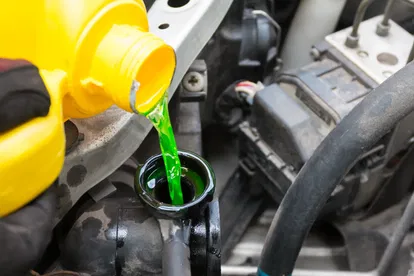Category:
What Is Engine Coolant? Uses & Importance

Engine coolant is among the most critical of all the fluids your vehicle relies on. Vital to engine performance and longevity, coolant regulates internal temperatures to prevent overheating and engine failure.
Explore the uses and importance of engine coolant below to understand the essential role this liquid plays.
What Is Engine Coolant?
Engine coolant is diluted antifreeze that circulates through an engine’s cooling system to remove heat and contaminants.
Coolant consists of a blend of ethylene glycol — the main component in antifreeze — and distilled water. Without coolant, gasoline and diesel engines would reach significantly high operating temperatures, causing fragile internal components to fuse and fail catastrophically.
The ethylene glycol found in engine coolant performs several key functions. This component raises the boiling point while lowering the freezing point, thereby increasing the temperature range within which the engine can operate efficiently. The distilled water aids in maintaining cleanliness and promoting even heat distribution.
As coolant flows through the radiator, water pump, engine block, thermostat, coolant reservoir, and rubber hoses, it draws heat away from the engine and routes it to the radiator.
Air rushing into the engine bay hits the radiator first — sometimes with the help of a fan — therefore cooling the liquid inside, which drops down to the bottom of the radiator to be pumped back through the engine and into the top of the radiator once more. This process repeats countless times under normal operating conditions.
Auto parts stores often sell conventional and extended-life coolants. Conventional coolant contains inorganic silicates that wear away over time. However, extended-life coolant can last up to 300,000 miles.
What Is Engine Coolant Used For?
Engine coolant performs each of the following functions within a sealed loop:
- Temperature regulation: Coolant keeps engines within a specified temperature range to promote performance and longevity.
- Corrosion protection: Specially formulated additives prevent corrosion.
- Boiling and freezing point control: Extending these contrasting temperature intervals ensures the coolant remains viable in extreme operating conditions.
- Performance optimization: When engines stay within a recommended temperature range, they’re able to achieve peak efficiency without sacrificing longevity.
Engine coolant also contains dyes, pH balancers, anti-foaming agents, and corrosion inhibitors. These additives prevent the formation of air pockets and corrosion that can interfere with temperature regulation. Dyes provide a visual cue regarding the coolant’s condition and contamination levels.
What Are the Different Types of Engine Coolant?
Engine coolants typically fall into three categories: inorganic additive technology (IAT), organic acid technology (OAT), and hybrid organic acid technology (HOAT).
Mixing different types of coolant is not advised, as the conflicting formulas and additives can degrade performance rather than enhance it. Explore these three coolant types below.
Inorganic Additive Technology (IAT)
Older vehicles typically require IAT coolants, which must be changed more frequently than modern-day blends.
Normally luminescent green, IAT coolants’ base is ethylene glycol. Additives such as silicates, phosphates, borates, and nitrites help insulate the cooling system and contribute to more efficient temperature regulation.
Organic Acid Technology (OAT)
OAT coolants are often available in orange, red, green, or blue. These environmentally friendly coolants are commonly used in newer vehicles that are beginning to show their age.
While their corrosion resistance pales in comparison to IAT coolants, OAT coolants can still extend the service life of an engine cooling system.
Hybrid Organic Acid Technology (HOAT)
Available in multiple colors, HOAT coolants can be found in the newest models and are considered the latest in coolant technology. These coolants contain inorganic and organic additives that offer improved corrosion resistance. Choose from phosphate, silicone, and phosphate-free variants.
What’s the Right Engine Coolant for Your Car?
The appropriate engine coolant for your vehicle typically corresponds to the automotive manufacturer. The owner’s manual contains recommendations regarding the specific brand or type of coolant required for optimal operation.
Failure to follow these guidelines can result in ineffective engine temperature regulation and cause the engine to overheat.
You can purchase manufacturer-specific antifreeze from your local dealership, often at a premium price. However, many auto parts stores sell aftermarket brands such as Peak, Havoline, and Valvoline.
When selecting between these variants, ensure that the antifreeze or coolant blend you choose meets the same specifications as those listed in your owner’s manual.
How Do You Maintain Engine Coolant?
Assuming a tight seal and functional cooling system, the engine coolant should only need to be topped off periodically.
Each time you check the motor oil levels, inspect the coolant overflow tank to ensure the fluid level is within the recommended range — typically between the “full” and “fill” lines. When topping off the engine coolant, use only distilled water.
As cooling system components age and wear, leaks can form near seals and connection points. Spilled antifreeze often emits a sweet odor that can attract pets and wild animals. Identify the source of these leaks by searching for antifreeze residue on the engine block and repairing or replacing the nearby components.
Your vehicle’s engine coolant should also be flushed every 100,000 miles for modern vehicles, or every 30,000 to 50,000 miles on older cars.
Draining and refilling the entire system with fresh coolant helps remove contaminants and renew the system’s performance. Maintain the new coolant by inspecting the cooling system for leaks or low fluid levels until it’s time for another coolant flush.
High-Quality Antifreeze and Coolant Products You Can Rely On
When it comes to managing engine operating temperatures, only the best coolants suffice. Cadence partners with leading brands to provide premium-grade antifreeze and coolant products for a wide range of applications, including heavy-duty industrial machinery, passenger cars, and extensive fleets.
Call us at 336-629-2061 to benefit from expert guidance on selecting the appropriate engine coolant to meet your specific needs.
Sources:
Engine Coolants | The University of Tennessee
Antifreeze | University of Michigan-Dearborn